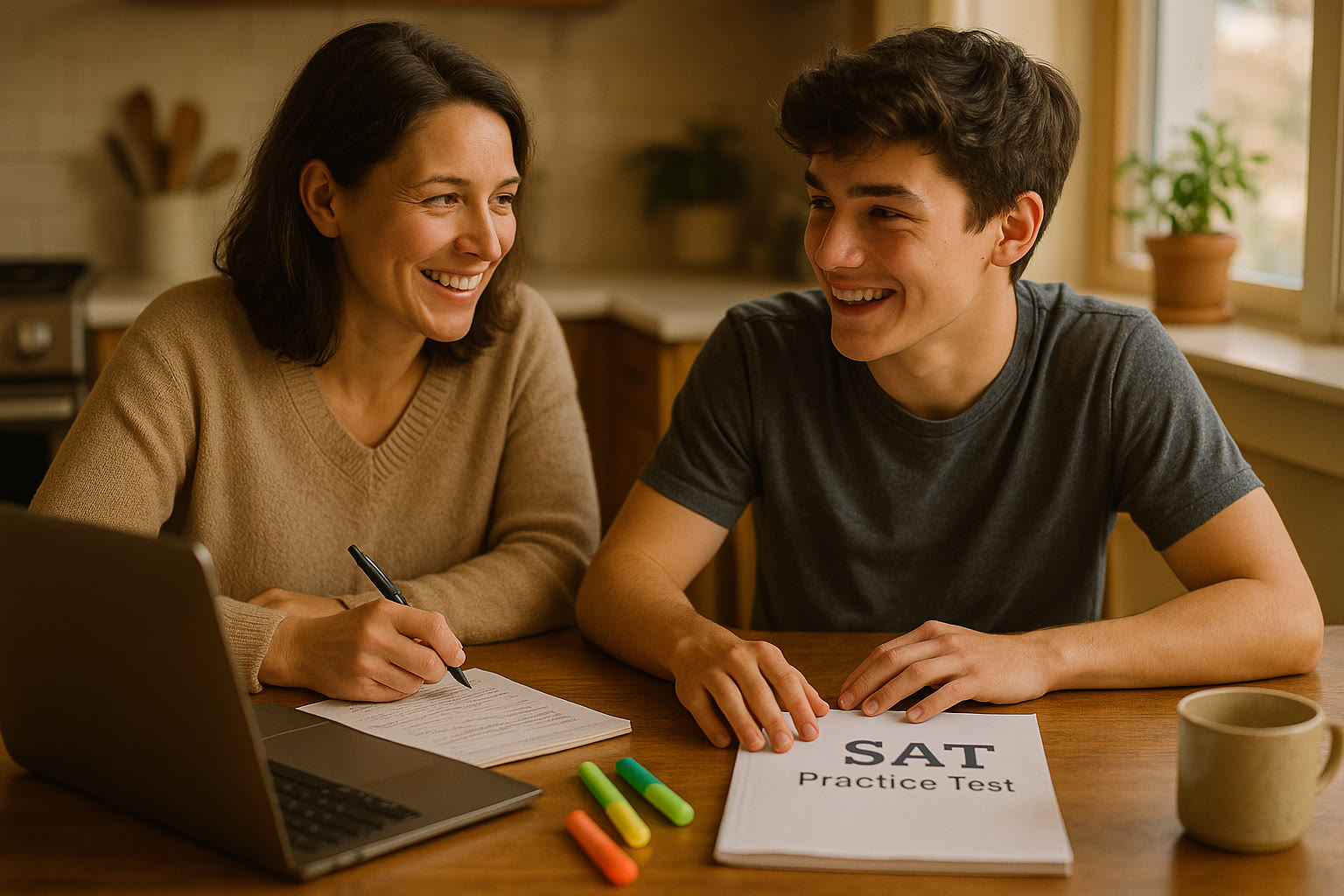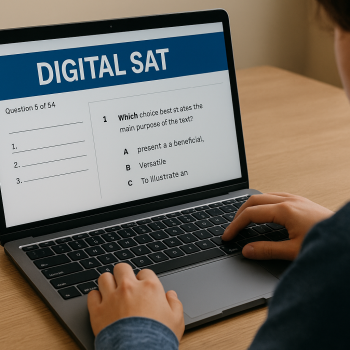When the SAT Tests More Than Knowledge: Understanding Parent–Teen Tension
The months leading up to the Digital SAT can feel like a pressure cooker. For teens, it’s a high-stakes measure they hope will open doors. For parents, it’s the latest, most tangible milestone in a long-running effort to help their child succeed. Those good intentions, paired with stress and uncertainty, can easily turn into arguments about practice time, scores, and priorities.
This guide is for both sides: for parents who want to support without smothering, and for teens who want autonomy without burning bridges. It’s practical, empathetic, and rooted in real-world ways families can reduce friction while making SAT prep more effective. We’ll cover communication techniques, schedules that respect everyone’s needs, conflict-avoiding study structures, and resources — including how Sparkl’s personalized tutoring fits naturally into a balanced prep plan.
Why Tension Shows Up (And Why It’s Normal)
Before listing solutions, it helps to normalize what’s happening. Tension often arises from a few predictable places:
- High expectations — from parents, peers, and the student themselves.
- Unclear roles — who decides practice routines, what counts as ‘enough’ study, and who orders resources.
- Different definitions of support — a parent might show love by monitoring every practice session; a teen might read that as distrust.
- Fear of the unknown — the college admissions landscape feels complicated and shifting, so anxiety translates into control behaviors.
Recognizing these root causes removes some of the heat. If both sides know where the friction comes from, they can address it directly instead of arguing about symptoms.

Core Principles to Guide Every Conversation
Start every plan with a few simple principles. These are touchstones you can return to when tempers flare.
- Respect autonomy: The teen owns the learning. Parents support, coach, and remove obstacles.
- Clarity beats assumptions: Agree on who does what, when, and how long.
- Small wins matter: Celebrate progress, not just the final score.
- Compassion first: A tense moment is often masking fear — name it, and it loses power.
Set a Family SAT Agreement
A simple, written agreement reduces misunderstanding. It doesn’t need to be formal — a one-page plan works wonders.
- Who handles scheduling? (Teen chooses study block; parent coordinates family calendar.)
- What are the study goals? (Practice tests, content targets, hours per week.)
- How will progress be checked? (Weekly check-ins, not daily surveillance.)
- What breaks and non-negotiables exist? (Sports, family dinners, mental health days.)
Sign it, or just read it aloud. The act of co-creating the plan shifts the power balance and reduces resentment.
Practical Communication Techniques
When conversations go sideways, use tools that defuse rather than escalate.
Use “Curious Questions” Instead of Directives
Swap commands for curiosity. Instead of saying, “You need to study two more hours,” try: “What part of the practice test felt hardest today?” Questions open doors; directives close them.
Try the 50/10 Check-In Rule
Set a recurring 10–15 minute weekly check-in where the teen talks for five minutes about what’s working and the parent listens for five minutes without interrupting. Then switch. Short, scheduled check-ins prevent blowups and keep communication predictable.
Use Empathy Statements
When emotions rise, empathy lowers defenses. Say things like: “I can see how much this matters to you,” or “I’m worried because I want you to have options.” Labeling feelings makes conflict less personal and more solvable.
Design a Realistic, Teen-Friendly Study Plan
One big cause of tension is unrealistic schedules. Teens are juggling school, activities, part-time jobs, and sleep. A plan that ignores life will fail.
Start With Availability, Not Ambition
Ask: When in the week does the teen actually have energy? Morning? After school? Use that. Small, consistent sessions beat marathon, last-minute cram sessions.
Sample Weekly Block
| Day | Study Block | Focus | Duration |
|---|---|---|---|
| Monday | After school (4–5pm) | Math practice (targeted drills) | 45 minutes |
| Tuesday | Evening (7–7:45pm) | Reading comprehension passage sets | 45 minutes |
| Wednesday | Short morning session | Vocabulary & timing strategies | 30 minutes |
| Thursday | Light review | Mistakes from practice tests | 30–45 minutes |
| Friday | Off or light study | Rest / casual review | 0–30 minutes |
| Saturday | Full practice test | Simulated Digital SAT | 3 hours (including breaks) |
| Sunday | Reflection & planning | Review errors and set goals for the week | 45–60 minutes |
This table is a template — adjust based on school load, activities, and natural energy patterns. The goal is predictability and sustainable progress.
Conflict-Safe Strategies During Study Time
Here are techniques to keep the peace during the heat of preparation.
Designate a ‘Study Zone’ and a ‘Support Zone’
Agree on a physical or virtual space where the teen studies independently (no hovering) and a separate time/space where the parent provides support. Having clear boundaries reduces micro-tension like constant checking or unsolicited tips.
Make Feedback Actionable and Specific
Vague praise or criticism breeds confusion. Replace “Do better” with concrete guidance: “On practice tests, you lost most points in data interpretation — let’s aim for two targeted sessions this week.”
Use a Mistake Log, Not a Score Shaming Session
Create a log where the teen records errors, the underlying concept, and one corrective action. It turns a score into a learning tool and removes moral judgment from mistakes.
When Emotions Escalate: Short Scripts to Reduce Heat
Having go-to phrases prevents reactive escalation. Keep them neutral, brief, and curiosity-driven.
- “Pause — let’s take five and come back.”
- “I want to understand. Can you tell me what you need right now?”
- “This feels tense. How about we table this until our weekly check-in?”
These scripts create procedural pauses so decisions don’t get made in the moment of highest stress.
Balancing Motivation and Mental Health
Succeeding on the SAT is important, but not at the expense of well-being. Teens with healthy routines and sleep consistently perform better.
Prioritize Sleep and Breaks
Don’t treat late-night cram sessions as heroic. Cognitive performance, especially reading comprehension and problem-solving, declines when sleep is sacrificed.
Embed Self-Care in the Plan
- Schedule at least one full day off per week.
- Include short physical breaks in study sessions (5–10 minutes every hour).
- Encourage non-academic social time to reduce burnout.
Using External Support Without Losing Autonomy
Sometimes tension eases when an experienced third party takes on coaching, tracking, and accountability. A neutral tutor or program can be a buffer: the teen receives targeted instruction and the parent gets expert guidance on progress.
What to Look For in Tutoring Support
- Personalized study plans that adapt to the teen’s strengths and weaknesses.
- One-on-one guidance rather than large-group classes — tailored attention builds confidence.
- Data-driven insights (practice test analytics, timing reports) so conversations are fact-based, not emotional.
For families considering outside help, options like Sparkl’s personalized tutoring can fit naturally: expert tutors, tailored study plans, and AI-driven insights provide clear progress markers. That transparency often reduces the “Are we doing enough?” anxiety and gives the teen ownership backed by professional support.

Turning Results Into Conversations, Not Punishments
When practice test scores fluctuate, it’s tempting to react strongly. Instead, use score data as diagnostic tools:
- Look for patterns across multiple tests before drawing conclusions.
- Ask: Did a poor score reflect one bad day, a timing issue, or a recurring content gap?
- Create a short action plan: three focus areas for the next two weeks and one metric to track improvement.
Keeping reviews tactical — and limited to 20–30 minutes — prevents scores from becoming the only thing that defines the teen’s worth or the family’s peace.
Role of Parents: Coach, Advocate, and Emotional Anchor
Parents who balance encouragement with trust create the best conditions for growth. Practical things parents can do:
- Provide logistical support: quiet space, reliable internet for the Digital SAT, healthy meals during intensive study periods.
- Be an advocate: communicate with schools about scheduling conflicts or request flexible deadlines if test dates overlap with major events.
- Model stress-management: share your strategies for coping with pressure rather than projecting alarm.
When parents act as logistical and emotional scaffolding, teens are freed to focus on learning and problem-solving.
Quick Conflict-Resolution Checklist
Keep this short checklist on the fridge or family calendar for instant reference when tensions spike:
- Step 1 — Pause: Take a 10-minute break.
- Step 2 — Name it: Each person states one feeling (e.g., “I feel anxious”).
- Step 3 — Clarify one fact: What specific behavior or outcome caused the tension?
- Step 4 — Agree on an action: One small, concrete step to try in the next 24 hours.
- Step 5 — Schedule the check-in: Decide when you’ll revisit the issue (don’t air grievances spontaneously).
When to Reconsider the Strategy
If the family has tried these tactics for a month and tension persists, consider a reset:
- Switch to a different study rhythm (shorter sessions, fewer practice tests).
- Introduce a neutral coach or tutor for accountability and technical guidance.
- Speak with school counselors for workload adjustments or emotional support resources.
Remember: changing the approach is not admitting failure — it’s smart adaptation.
Final Thoughts: Make the SAT a Chapter, Not the Whole Story
At its best, SAT prep teaches useful habits — time management, focus, resilience — that carry far beyond a single test. Families that invest in calm structure, mutual respect, and evidence-based support tend to get better results and preserve relationships. If tension is high, small changes — predictable check-ins, a clear study agreement, targeted tutoring — often yield outsized benefits.
For many families, integrating tailored tutoring like Sparkl’s (with one-on-one guidance, customized study plans, and data-based insights) removes logistical guesswork and creates a neutral partner in the process. That can be exactly what the dynamic needs: less friction, clearer progress, and a teen who feels in control.
Parting Advice for Tonight
Pick one small step right now: write a two-sentence study agreement, schedule a 15-minute check-in this week, or book one targeted tutoring session. Momentum builds from tiny, consistent actions. You don’t have to get it perfect — just get started together.
Good luck. You’re not alone in this, and when families work as a team, the SAT becomes one achievable milestone among many.














No Comments
Leave a comment Cancel